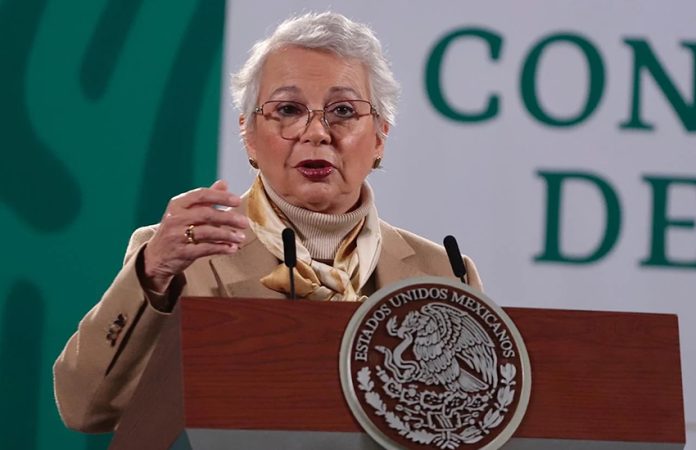Most attacks against politicians and candidates during the period leading up to this Sunday’s elections were not related to the electoral process, Interior Minister Olga Sánchez Cordero said Thursday.
This electoral season, which officially began last September, has been the most violent on record with 782 acts of aggression against politicians and candidates, including 89 murders, according to the risk analysis firm Etellekt, which tracks election campaign violence.
But Sánchez claimed that few of the acts of aggression — among which were threats, homicides, attempted murders, assaults and kidnappings — were related to the June 6 municipal, state and federal elections.
“They’re reprehensible incidents, their perpetrators must be punished with all the rigor of the law, but as far as we know they don’t have an electoral motive,” she said during a virtual meeting with state election officials.
“The incidents that have occurred, affecting candidates of all parties, are not related to the electoral process in the vast majority of cases,” Sánchez clarified.
The interior minister said she was aware of three main motives for the attacks against political figures.
“… The ministry I’m in charge of can identify [three] clearly differentiated motives. Firstly, conflicts that are the product of old social demands, mainly in rural areas and indigenous communities, in Chiapas, Oaxaca, Nayarit and Michoacán, for example,” Sánchez said. She did not give examples of what she meant by social demands but was likely referring to localized demands for infrastructure and services or those related to land disputes.
“Secondly, there are union, farmer, popular and student organizations that use the electoral circumstances to exert pressure, sometimes violently, for the satisfaction of their demands; it has nothing to do with the elections,” she said.
“… And thirdly, criminal actions, which especially affect the municipal realm. That’s why I’ve said that the weak link in the chain of governability is in some municipalities,” she said.
Three-quarters of the candidates attacked during the electoral season were seeking municipal positions such as mayor or councilor, according to Etellekt. In addition, three-quarters of the total number of politicians or aspirants who were victims of aggression were opponents of the party in power in the state where the act of aggression against them occurred.
The interior minister’s remarks came a day after President López Obrador declared that there is “peace and tranquility” throughout Mexico, despite clear evidence to the contrary.
Sánchez asserted that citizens will be able to vote in peace at this Sunday’s elections, which will be the largest in Mexico’s history.
“The problems we face are … isolated. They affect very few municipalities and very few polling booths. In no case do these acts [of aggression] or incidents place the validity of a district or state election at risk,” she said.
“The cases in which a municipal election could be affected are limited. To count them, I believe that the fingers on one’s hands are more than enough. Of course, all aggression against candidates, no matter which party [they belong to], is a violation of democratic governability,” Sánchez said.
More than 22,000 elected positions will be up for grabs on Sunday, most of which are municipal and state positions. At the federal level, voters will elect 500 lower house deputies, while the governorships of 15 states, including Nuevo León, Baja California, Michoacán and Guerrero, will also be decided.
Source: El Economista (sp)
